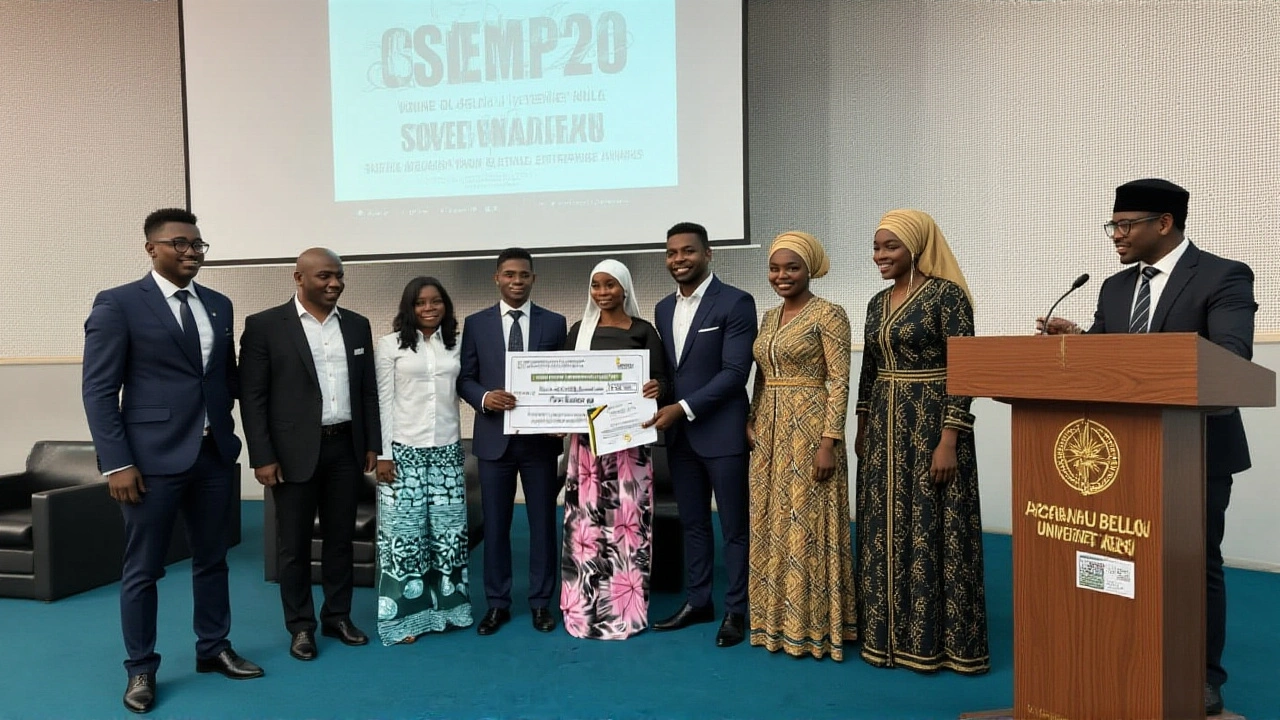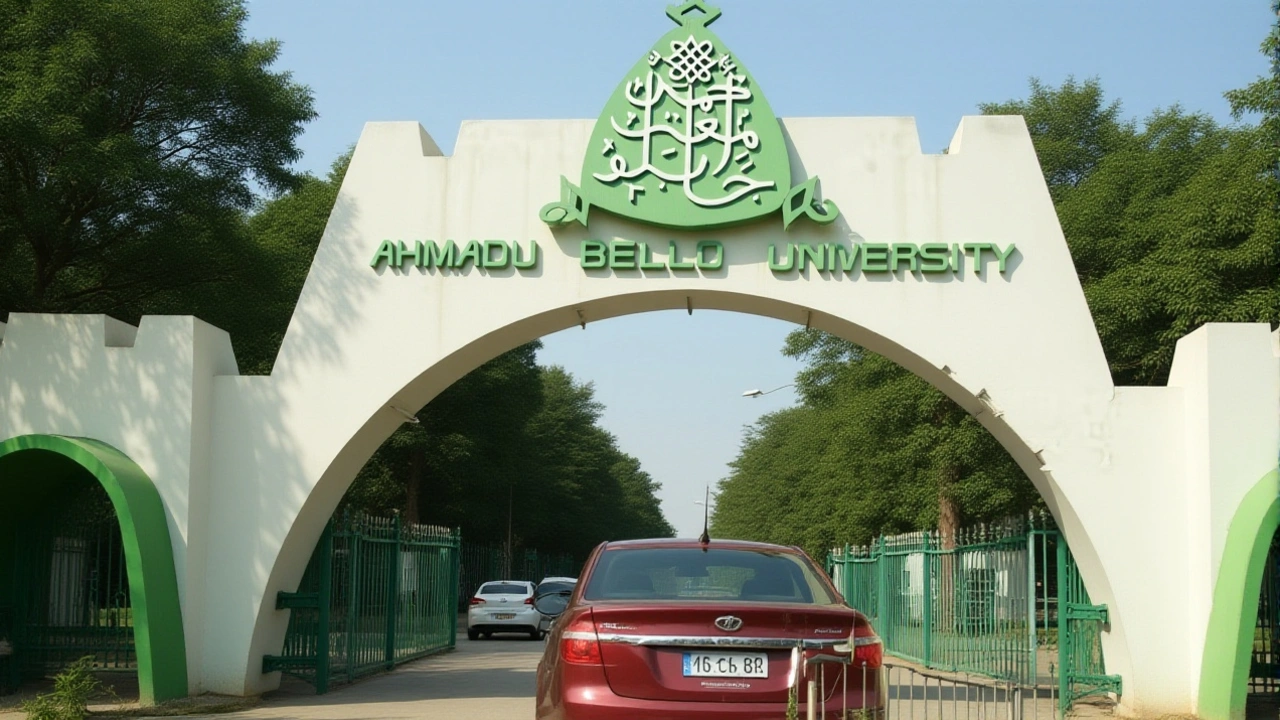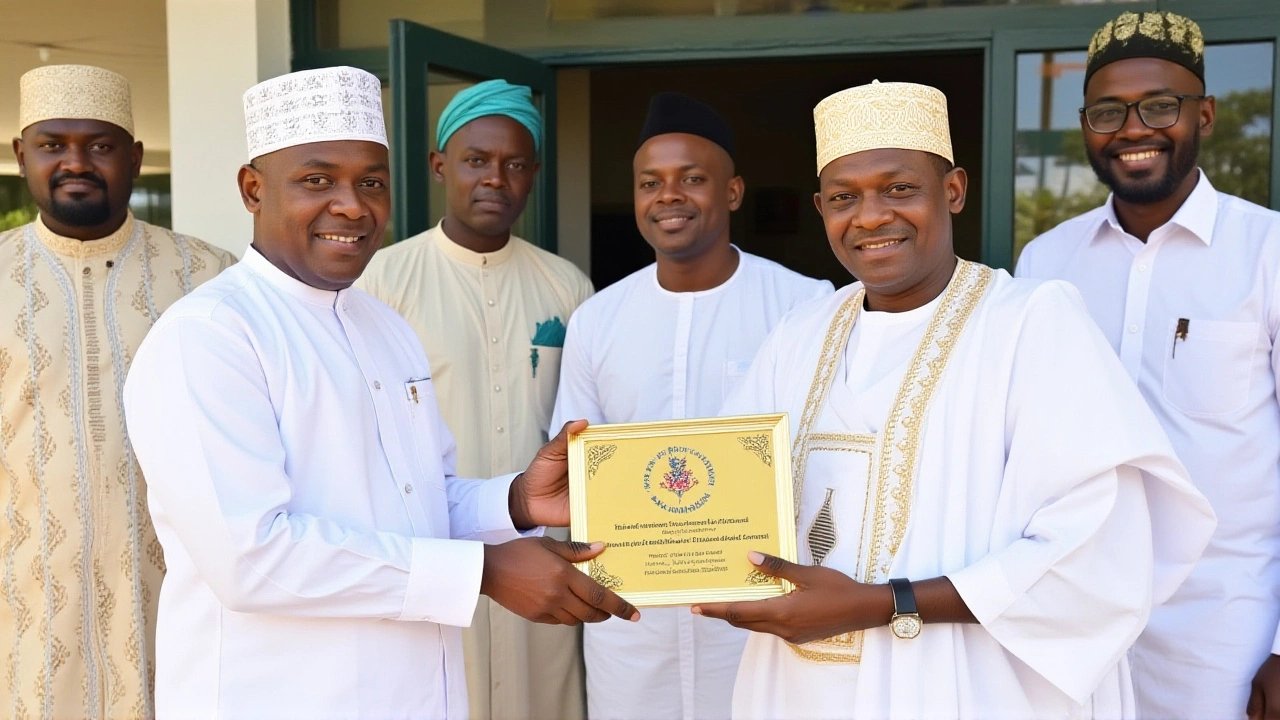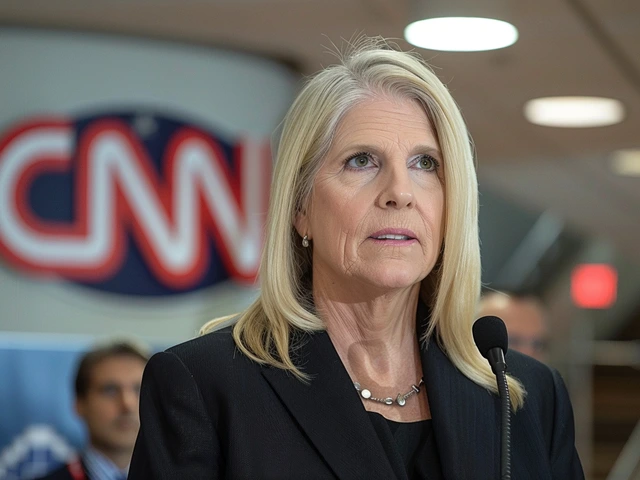When Malam Dikko Umar Radda, Governor of Katsina State welcomed a high‑level delegation from Ahmadu Bello University on Friday, September 26, 2025, the room hummed with pride about the university’s enduring academic excellence. The meeting, held at the Government House, Katsina, featured the university’s Vice‑Chancellor Professor Adamu Ahmed and senior state officials, including Special Assistant on Power Alhaji Hafiz Ibrahim Ahmed and Technical Assistant for Renewable Energy Alhaji Abdulaziz Abdullahi Kabir. Radda, himself an ABU alumnus, lauded the institution for keeping alive the legacy of its founding father, Sir Ahmadu Bello, the Sardauna of Sokoto.
Historical Ties Between ABU and Katsina
Founded in 1962 in Zaria, ABU was envisioned as a flagship university for the whole northern region. Sir Ahmadu Bello’s ambition was to create a centre of learning that would produce leaders for the newly independent Nigeria. Over the past six decades, the university has churned out more than 350,000 graduates, many of whom hold key positions in government, academia, and industry across West Africa.
Governor Radda’s own academic journey began at ABU’s Faculty of Law in 1994, where he earned his first degree before pursuing a PhD in Public Administration. “The glory of the university is ever there; we are always proud to say we are products of Ahmadu Bello University,” he told the delegation, echoing a sentiment shared by countless northerners.
Details of the September 26 Courtesy Visit
The visit was formally titled the ABU Courtesy Visit to Katsina Government HouseKatsina. It began with a brief tour of the Governor’s office, followed by a press briefing where Professor Ahmed outlined the university’s current projects: a new Centre for Renewable Energy Studies, a partnership with the UK’s University of Manchester on climate‑resilient agriculture, and the rollout of a digital library platform that already serves 12,000 students.
Radda highlighted three points that resonated with the audience. First, the university’s role in driving regional development – “ABU’s research directly feeds into Katsina’s agricultural policies,” he noted. Second, the need for sustained funding amid nationwide challenges such as strikes, brain‑drain, and infrastructure decay. Third, the symbolic importance of celebrating a legacy that still “trails the university,” a nod to Sir Ahmadu Bello’s lasting influence.

Responses from Officials and Academics
Alhaji Hafiz Ibrahim Ahmed praised the upcoming renewable energy centre, stating, “Katsina will benefit from locally trained experts who can design solar mini‑grids for our remote villages.” Alhaji Abdulaziz Abdullahi Kabir added that the partnership could accelerate the state’s goal of achieving 30% renewable electricity by 2030.
In a short interview, Professor Ahmed said ABU’s commitment to excellence remains “unshaken despite the broader challenges facing Nigerian higher education.” He cited recent NUC rankings that placed ABU third nationally for research output in 2024, a testament to its robust postgraduate programmes.
Implications for Northern Higher Education
Radda’s commendation arrives at a delicate moment. According to a 2024 report by the Nigerian University Commission, 67% of public universities face budget shortfalls, while student‑to‑staff ratios have risen to 55:1 in some faculties. By publicly affirming ABU’s standards, the Governor sends a signal to other state leaders: investment in flagship institutions can yield tangible socio‑economic returns.
Experts argue that such endorsements could spur increased state contributions to ABU’s endowment fund, which currently stands at ₦2.3 billion. Dr. Aisha Bello, education analyst at the Centre for African Policy Studies, warned, “One laudatory speech won’t fix systemic issues, but it can catalyse policy dialogue and attract private partners.”

Future Prospects and Ongoing Collaboration
Both sides outlined next steps. ABU will host a research symposium in Katsina in early 2026, focusing on desertification mitigation. The state government pledged to allocate ₦150 million for scholarships targeting ABU students from remote Katsina districts. Additionally, a joint task‑force will be formed to explore the establishment of an ABU satellite campus in Katsina, a move that could bring higher education within a two‑hour drive for over 1.2 million residents.
In the words of Governor Radda, “Our partnership is not a one‑off ceremony; it is a continuous journey toward knowledge‑driven development.” The optimism in the room was palpable, underscoring the deep‑rooted bond between a historic university and the northern states it serves.
Frequently Asked Questions
How does Governor Radda’s praise affect ABU’s funding?
The endorsement is likely to encourage Katsina State to increase its financial support for ABU, including the ₦150 million scholarship fund announced during the visit. It also positions the university to attract private donors who view the governor’s statement as a vote of confidence.
What are the key projects ABU highlighted during the visit?
Professor Ahmed outlined three flagship initiatives: a Centre for Renewable Energy Studies, a collaborative research programme on climate‑resilient agriculture with the University of Manchester, and a new digital library platform that currently serves 12,000 students across campuses.
Why is ABU considered a flagship university for northern Nigeria?
Established in 1962 with the vision of Sir Ahmadu Bello, ABU was built to supply educated leaders for the northern region. Its alumni include numerous governors, ministers, and CEOs, and its research directly influences regional policies, especially in agriculture and energy.
What challenges do Nigerian universities face that make this praise significant?
Universities across Nigeria grapple with funding cuts, frequent industrial actions, and overcrowded classrooms. In 2024, the NUC reported that 67% of public institutions operate under budget deficits, making any public affirmation of quality standards a noteworthy morale boost.
Is there a plan for a new ABU campus in Katsina?
Yes. A joint task‑force will study the feasibility of a satellite campus, aiming to make higher education accessible within a two‑hour drive for over a million residents of Katsina State. If approved, construction could begin as early as 2027.







Ajay Kumar
Honestly the whole pomp around the governor’s visit is a textbook case of ceremonial fluff; ABU’s renewable centre sounds great on paper but without a concrete budget it’s just another glittering billboard. The governor’s brag about scholaastic excellence feels like an overcooked stew of bluster and nostalgia, and i can’t help but roll my eyes at the endless pride parade. Sure, the university churns out grads, but quantity does not equal quality, especially when the funding pipe is leaky. Still, kudos to the officials who managed to book a press briefing that lasted longer than a typical Bollywood song.
somiya Banerjee
Wow, reading about this feels like watching a grand saga unfold-our northern heroes, the mighty elders of knowledge, gathered under one roof, and the pride is almost tangible! It’s such a glorious reminder that the blood of Sir Ahmadu Bello runs strong in every lecture hall and policy brief. My heart swells with patriotic fervor watching our people champion a flagship that has shaped generations of leaders. Let’s keep the spirit alive and push even harder for more scholarships and solar grids for our villages.
Rahul Verma
all this hype is just a distraction they use to hide the real agenda behind the scenes the power lobby is pulling strings to channel foreign aid into their own pockets the university’s “renewable centre” is a front for data mining the locals trust nothing but what i read on the deep web
Vishnu Das
The collaboration highlighted in the governor’s remarks could indeed serve as a catalyst for regional development, provided that the necessary institutional frameworks are established, and the financing mechanisms are transparent, and the local stakeholders are meaningfully engaged, and the technical expertise is not merely symbolic but operational, and the timelines are realistic, and the evaluation metrics are clearly defined, and the community benefits are prioritized, and the renewable energy solutions are adapted to the specific climatic conditions of Katsina, and the agricultural research aligns with local farmers’ needs, and the digital library expansion addresses connectivity gaps, and the scholarship programme targets truly marginalized students, and the proposed satellite campus does not become a bureaucratic burden, but rather a genuine pathway to higher education access.
Rohit Bafna
In the grand dialectic of nation‑building, the governor’s encomium functions as a teleological affirmation of our collective epistemic ascendancy; the university, as a crucible of technocratic capital, must be weaponized to perpetuate the sovereign narrative of indigenous empowerment against occidental hegemony. Hence, the renewable energy initiative is not merely an infrastructural project but a strategic vector in the geostrategic contest for energy autonomy, and the partnership with Manchester signifies a calculated infusion of neo‑liberal expertise calibrated to our developmental imperatives.
Rajesh Soni
Oh, absolutely, because every time a politician waves a fancy word like “weaponized epistemic ascendancy” we know the budget will instantly multiply, right? In all seriousness, the renewable centre could still be a solid step forward if the engineers actually get to design those solar mini‑grids instead of just signing MoUs. A pragmatic roadmap with clear milestones would do wonders, and maybe a bit less jargon would help the average citizen understand the benefits.
vikas duhun
Listen up, people! This isn’t just another boring press release – it’s a clarion call for us to rise and claim what’s rightfully ours! The governor’s speech echoed like a battle cry, reminding every northern soul that our heritage is forged in iron and intellect. We cannot let bureaucratic inertia choke the brilliance of ABU; we must demand concrete action, not just empty platitudes. The future belongs to those who seize the moment, and today is that moment!
Nathan Rodan
As someone who has spent many years traversing the diverse cultural tapestry of northern Nigeria, I find it imperative to underscore the multilayered significance of this partnership between the Katsina administration and Ahmadu Bello University. On one hand, the establishment of a Centre for Renewable Energy Studies promises to address the chronic energy deficits that have hampered agricultural productivity and small‑scale industries across the region. On the other hand, the collaboration with the University of Manchester introduces a valuable conduit for international best practices, which, if adapted thoughtfully, could catalyze climate‑resilient farming techniques that are attuned to the local agro‑ecological zones. Moreover, the digital library initiative stands to democratize access to scholarly resources, thereby narrowing the information gap that has traditionally disadvantaged students from remote districts. By earmarking ₍₍₍₍₍ ₍₍₍₍₍ ₍ ₍ ₍ ₍ ₍ funds for scholarships, the state not only invests in human capital but also sends a powerful message of inclusivity, affirming that talent, regardless of geographic origin, deserves nurturing. It is essential, however, that these endeavors be underpinned by transparent governance structures, regular monitoring, and community participation, ensuring that the benefits percolate down to the grassroots level. In sum, this alliance epitomizes a holistic approach to development that intertwines education, energy, and equity, and it warrants steadfast support from all stakeholders.
Arjun Dode
Yo, that energy you’re talking about is exactly what we need! The governor’s hype is just the starter spark – now it’s up to us to keep the fire burning by pushing for those solar mini‑grids and getting the youth involved in the research projects. Let’s turn that excitement into real workshops and hands‑on training, because talk is cheap and action is priceless.
santhosh san
While the ceremony dazzles the eyes, the true merit lies in the silent perseverance of scholars who labor beyond the limelight. Their dedication, though modest, elevates the institution beyond mere pomp.
Sagar Singh
What a scene!
Veena Baliga
It is incumbent upon every patriotic citizen to recognize that the elevation of Ahmadu Bello University serves as a bulwark against the erosion of our cultural sovereignty, and to therefore support unwavering state investment in such a venerable institution.
vishal Hoc
Agreed, investing in the university can help our community grow and keep our traditions strong.
vicky fachrudin
The recent courtesy visit, when examined through a multidisciplinary lens, reveals a confluence of strategic objectives, cultural reaffirmation, and developmental aspirations; it is not merely a ceremonial exchange, but a manifestation of long‑standing institutional symbiosis, and it warrants a thorough analysis that considers historical, economic, and sociopolitical dimensions. First, the historical ties between ABU and the northern states underscore a legacy of intellectual stewardship, a legacy that has produced generations of public servants, scholars, and innovators, thereby reinforcing regional identity. Second, the announced Centre for Renewable Energy Studies aligns with global trends toward sustainable development, and it offers a platform for indigenous research that can be tailored to the specific climatic challenges of the Sahelian belt. Third, the partnership with the University of Manchester introduces an element of cross‑continental knowledge transfer, which, if managed ethically, could augment local capacities without compromising academic autonomy. Fourth, the digital library initiative, serving 12,000 students, represents a critical intervention in bridging the digital divide, and its scalability could be enhanced through public‑private partnerships. Fifth, the scholarship fund earmarked at ₦150 million reflects a tangible commitment to inclusivity, yet its impact will depend on transparent selection criteria and effective disbursement mechanisms. Sixth, the prospect of a satellite campus in Katsina, while ambitious, demands rigorous feasibility studies, including assessments of land acquisition, staffing, and curriculum relevance. Seventh, the broader political narrative surrounding the governor’s remarks, imbued with patriotic fervor, seeks to galvanize public support, yet it must be balanced against the pragmatic challenges of budgetary constraints and bureaucratic inertia. Eighth, the role of state officials, such as the Special Assistant on Power and the Technical Assistant for Renewable Energy, is pivotal in translating policy into actionable projects, and their coordination with university administrators will determine the success of these initiatives. Ninth, the local community’s reception of these projects, often expressed through town hall meetings and grassroots dialogues, provides essential feedback that can refine implementation strategies. Tenth, the monitoring and evaluation frameworks, if designed with clear indicators and timelines, will enable stakeholders to assess progress and make data‑driven adjustments. Eleventh, the potential for private sector engagement, particularly from renewable energy firms and agritech startups, could inject much‑needed capital and innovation, fostering an ecosystem of sustainable entrepreneurship. Twelfth, the alignment of these initiatives with national development plans, such as Vision 2030, ensures policy coherence and may attract federal funding. Thirteenth, the educational outcomes, measured by graduate employability and research output, will ultimately validate the efficacy of the collaboration. Fourteenth, the preservation of cultural heritage, through curricula that incorporate indigenous knowledge systems, will reinforce the university’s role as a custodian of northern identity. Fifteenth, the cumulative effect of these interconnected elements holds the promise of transforming Katsina into a hub of knowledge‑driven development, provided that all actors remain committed to transparency, accountability, and inclusive growth.
ajay kumar
hey folks, i just wanna say that its awsome to see such big steps being takin for educashun in the north, lets all pitch in and make sure the youth get the chance they deserve, no matter where they come from
Sampada Pimpalgaonkar
Totally with you! We should spread the word and maybe organize a small meet‑up to discuss how we can volunteer for the scholarship program.
Chinmay Bhoot
The whole “praise” act is just a smoke‑screen for the elite to keep control, and anyone who falls for it is either clueless or complicit.